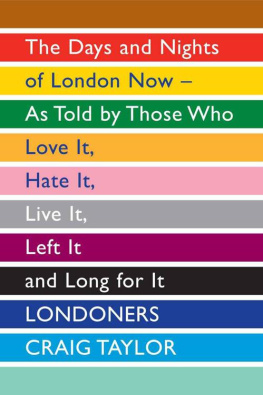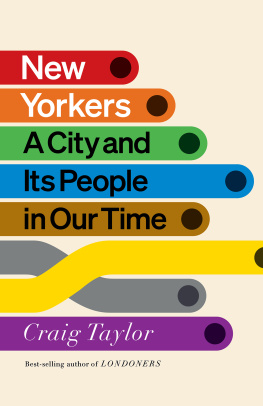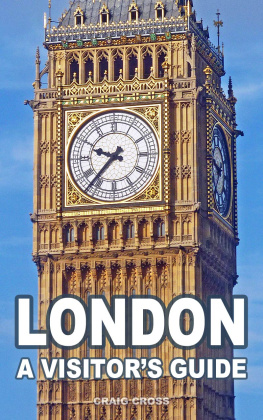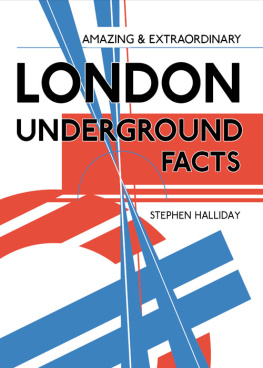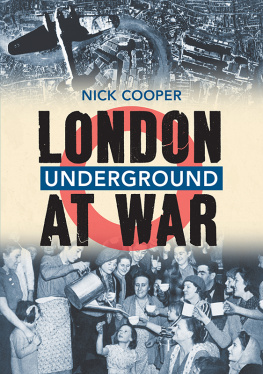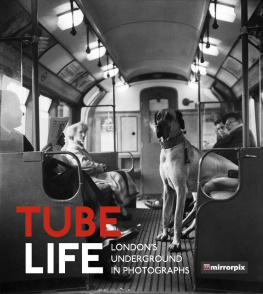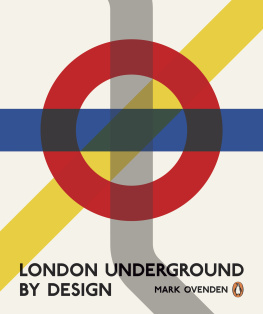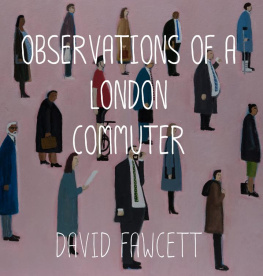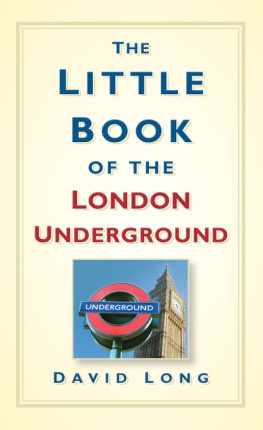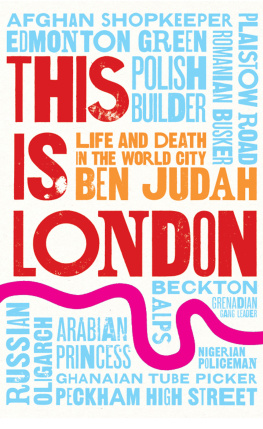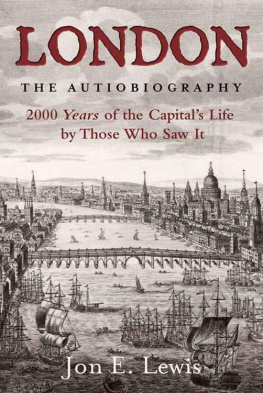Londoners
The Days and Nights of London Now
As Told by Those Who Love It, Hate It,
Live It, Left It and Long for It
Craig Taylor
For Matt Weiland
CONTENTS
What is the city but the people?
Shakespeare, Coriolanus
No one, wise Kublai, knows better than you that the city must never be confused with the words that describe it. And yet between the one and the other there is a connection.
Italo Calvino, Invisible Cities
If there is just one London, I have two arses.
A Thames River boatman
INTRODUCTION
I grew up in a small, seaside village in western Canada and most summers I travelled across the country to my grandmothers summer cottage on the shores of Lake Simcoe in southern Ontario. The walls were covered in classic cottage decor, including a series of felt pennants from every country my grandmother had visited during a European excursion in the early Sixties. There were newspaper clippings pinned to the wall yellowed recipes and news items. In the back kitchen, which always smelled of turpentine, someone had tacked up an aerial photograph of London England, not nearby London, Ontario. I spent a lot of time looking at that mysterious view. At the bottom of the poster was the famous Samuel Johnson quote Ive now heard repeated, mangled and paraphrased many times: When a man is tired of London he is tired of life; for there is in London all that life can afford. I didnt understand it at the time. The view of Tower Bridge looked grey and forbidding. It begged the question: What kind of person ended up in London?
Years later, that person was me. I moved to London in the middle of a petrol strike in the autumn of 2000 a time of panic-buying, political recriminations and worries about food distribution. I arrived on an overnight transatlantic flight from Toronto and emerged from Clapham Junction train station in the afternoon. The traffic was light. The sun was warm. The newspapers warned of impending disaster, riots and a return to the Seventies; as if this city could ever move back in time.
I knew no one really, but I had a contact. I was retrieved from the station by an Australian friend of a friend who had just enough fuel for the journey to my new home on a short street in Brixton without us having to get out and push the car. Here we were, two colonials coasting on fumes in London at the start of a new century.
From the window of my new room I could see the blinking light of the HSBC tower in Canary Wharf, then the tallest building in England. But what lay between was a mystery. So I turned to the London A-Z given to me by a friend who had lived in London years ago, who had been so sickened by the damp he chose Prague instead. I soon learned that for many the A-Z is an article of faith. Designed around the same time as the iconic Tube map in the 1930s, it is equally omnipresent in the city, used as much by residents as tourists. It doesnt simply show you the way home so much as prove that the rest of London, the parts that arent part of your daily routine, still exist. In those first few weeks I saw it tucked into handbags and on the dashboards of cars; an essential companion to the city.
I was grateful for the gift, though its pages were yellowing and slipping from its plastic rings. I tested it out on the first night and flipped from my new home on page 93, east to page 94, then north to page 79 and east to Canary Wharf on page 80. It is an impressive spread for a new reader. The bottom half of the two pages are filled with a mess of streets, twisting and ending, some with illegibly small names. Some seemed to give up, disappear and fade back into the page. At the top of pages 79 and 80, the Thames curved around the Isle of Dogs and then made another U around Blackwall Point. There was a descending list of wharves printed on the blue of the river Morden, Enderbys, Pipers, Badcocks, Lovells, Palmers, Columbia and I wondered if any still served a nautical purpose or if theyd become mere decorative names. Printed in the Nineties, my A-Z showed the demolished South Eastern Gas Works where the Millennium Dome now stands. Most A-Z s are half dead, because documenting a city as alive as London will always be an impossible task.
I walked around my neighbourhood. I lurched around, graceless, with a rucksack on my back. I looked at peoples faces on escalators for a second too long. I hadnt yet become an urban otter one of those sleek Londoners who moves through the city with ease. Theyre the ones who seem slow and graceful but are always covering ground; who cross streets without looking back and forth; who know how to fold a newspaper crisply in the middle of a packed Tube train.
At nearby Brixton market I came across a stallholder selling cheap, bedazzled jeans and mobile-phone paraphernalia. He sat behind a desk covered in phone cards and posters that listed different rates for the different countries. The countries were given in three columns, set in the same size type. My country was there, but it was not, by far, the most expensive, just a name among names. I tried to buy a 5 phone card. Four pounds, said the man behind the desk. How much is that one? I asked, pointing to another 5 card. Three pounds, he responded. There was a system at work here. I hesitated before it, and he left me to sell a pair of jeans to someone else.
Later I opened a door to a payphone. It was covered with a full-length KFC ad, so I didnt notice the man crouching inside. He had just begun an ambitious inhalation on his crack pipe and our eyes met. He apologized and I apologized and he apologized again and I closed the door.
One day, while walking home with a friend, I looked to my left and saw the graceful movement of a pickpockets hand as it slid into the pocket of my friends coat. I looked into the pickpockets face. He looked back and withdrew his empty hand. He remained expressionless, purposefully vacant, and he drifted back into a stream of people. He faded into passing traffic. It was like watching an old master, well versed in perspective and street camouflage, the latest in a long line.
Who were these Londoners? Not long after, a girl approached me outside Brixton Tube station. Her mascara was running; she had been crying for a while. Dressed in school uniform, she told me through her hiccups and tears that she was a long way from home. When I apologized and walked on, she followed and stopped me again, this time at the lip of the station. Her arm was on my jacket; a new sensation, a sincere touch. Where do you need to get to? I asked. Her reply Staines left me none the wiser. The way she said it made it sound wicked a place where the mothers stand cross-armed by the windows until their daughters get home. She shivered and looked expectant, so I walked her to a bus stop, gave her a 1 coin and stood beside her, hands in my pockets. After several minutes watching double-deckers pull up and pull away, she scornfully turned away and walked off. My London self, I thought, when he finally arrives, will not be taken advantage of so easily.
I regularly felt lonely, duped, underprepared, faceless, friendless, but mostly a mixture of those on nights when I was pressed against the steamed windows of the 159 bus by grunting old men, big-hipped matriarchs or by a Londoner who insisted on making room for his fold-up bike. Moisture seeped into the dewy Routemasters; if I slipped my hand beneath the seat, Id have plucked mushrooms. On some nights, after more of the city revealed itself, I walked home through a new combination of streets, attentive, watchful, aware of my setting. Not far from my rented room was the Southwyck House estate, also known as the Barrier Block, the most unwelcoming public housing estate in Brixton. The design was meant to minimize noise for residents but the result is a huge layered wall dotted with depressingly small windows. Its often mistaken for Brixton Prison. I became transfixed by it one night when walking by, drunk. What was scarier? The sodium lights and the small rectangular windows, or the personal touches, the shadows of stuffed animals? The Barrier Block looked stronger than the Bank of England, more powerful than Parliament; and who knew anything of the lives of the people who lived there? Why did my old A-Z feel more and more incomplete and bloodless with each day?

